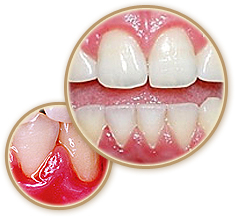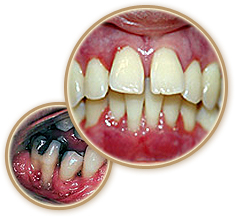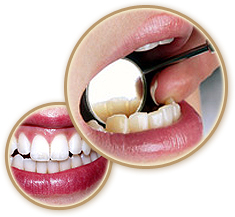 The treatment of periodontal diseases is of outstanding importance since the health of the tooth’s frame forms the basis of any further intervention, be it replacement, filling or root canal treatment. The treatment of periodontal diseases is of outstanding importance since the health of the tooth’s frame forms the basis of any further intervention, be it replacement, filling or root canal treatment.
Periodontal disease (parodontitis) is known among everyday people as gum bleeding or gingival abrasion. It is actually one of the most frequent chronic infectious diseases which can be considered a popular disease. One of its forms is gingivitis, when the process is still reversible and does not affect the tooth’s frame.  The other, more severe case is when due to a lack of proper treatment the inflammation extends to the fixing elements of the tooth; while in its most severe form serious bone decay may be detected which may lead to the loosing of the teeth. The other, more severe case is when due to a lack of proper treatment the inflammation extends to the fixing elements of the tooth; while in its most severe form serious bone decay may be detected which may lead to the loosing of the teeth.
Periodontal diseases are caused by pellicle, i.e. dental plaque. There are significant individual differences in the quantity and composition of the plaque a person may endure without inflammation. This balance is considerable determined by the organism’s ability of defence and may be influenced by other plaque formation promoting factors. This explains why there is an increased risk of the development of periodontal diseases in case of certain internal diseases (pl. diabetes, diseases of the haemopoietic organs, the immune system, and metabolic diseases) and during pregnancy, which however can be avoided with proper intervention. In addition, this is the reason why a relatively aggressive form of inflammation can develop in case of certain types of periodontal diseases (especially in case of young people) besides a totally healthy gum and relatively good oral hygienic conditions. In the formation of certain types of periodontal diseases the presence of genetically determined inflammatory materials may be detected. In case of people having a certain type of gene, the risk is bigger. In the formation of certain types of periodontal diseases the presence of genetically determined inflammatory materials may be detected. In case of people having a certain type of gene, the risk is bigger. Diagnosing and treating the periodontal disease (in the possession of X-ray images and further examinations, results) is a dentist’s task. Early diagnostics is essential, because the earlier the treatment starts, the more promising the results are. Unfortunately above 40 periodontal disease and not mainly decay is responsible for the losing of the teeth!  Among people suffering from periodontal disease the development of cardiovascular diseases and premature delivery (in case of women) are proved to happen more often. Among people suffering from periodontal disease the development of cardiovascular diseases and premature delivery (in case of women) are proved to happen more often.
In case of very deep pockets periodontal (gum) operations can help. In case of losing any strongly moving teeth, the remaining teeth have to be fixed and the missing teeth have to be replaced which already belongs to the field of prosthetic (tooth replacement) rehabilitation. There is also a severe and aggressive form of periodontal disease, in case of which different surgical procedures are indispensable. These may be closed or open curettages and different bone grafting procedures which are totally painless.
| 

 és Webmark
és Webmark